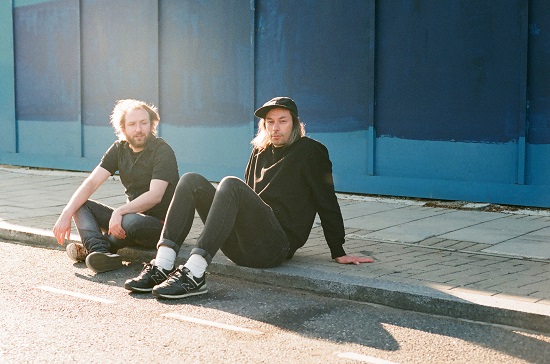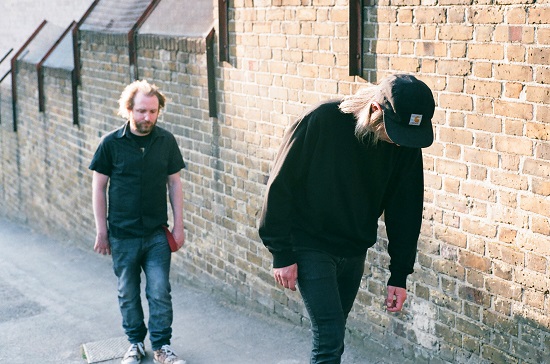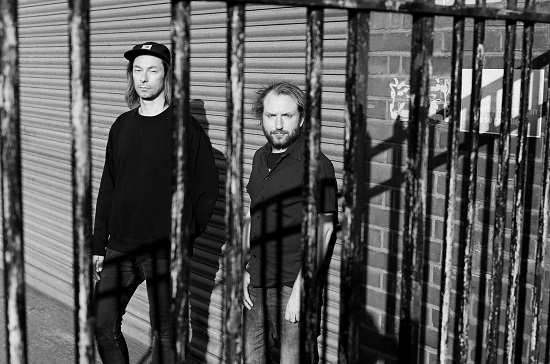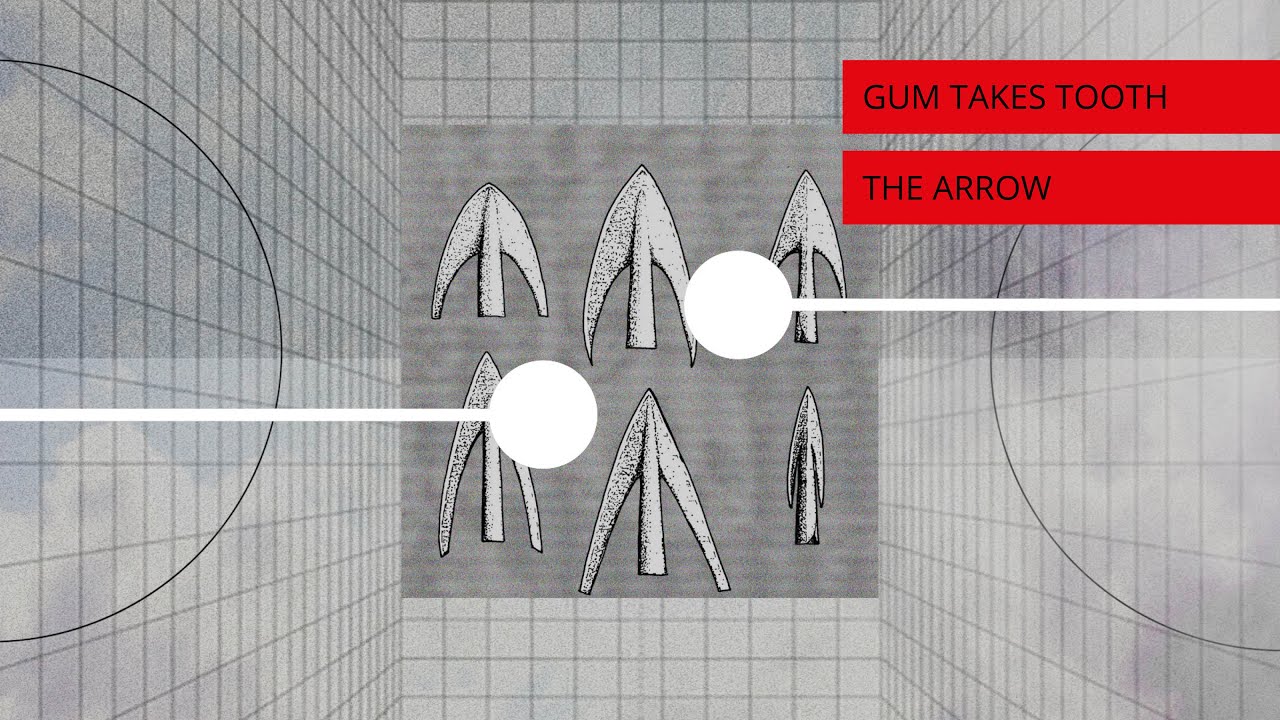Jussi Brightmore, Tom Fug and I were meant to take a walk around North London’s Walthamstow Marshes to discuss the pair’s latest record as Gum Takes Tooth. The marshes are next to the studio where that phenomenal album Arrow was recorded, but also represent a uniquely neutral space that mirrors its themes. It is an album informed by the endlessly mounting pressure of trying to both exist and create art in the capital, by the urge for space amidst the relentless drive of redevelopment, and the uncertain, nomadic lifestyle these issues breed. It’s an album that is breathlessly intense, at times dark and oppressive but at others euphoric despite itself. It is already one of 2019’s very best.
As cold February rain lashes down and spoils our plans, however, we must instead take shelter in The Victoria, a strange but lovely haunt that’s equal parts gay bar and old man pub, with pride flags hanging above the dartboard and pool table. Fug and I arrive first as a barmaid sways merrily around the room collecting glasses, singing along to ‘Can’t Take My Eyes Off You’ which plays on the jukebox. Brightmore arrives a few minutes later; his two-year-old daughter took a little longer than usual to get to sleep. The act of trying to raise a young family amidst all this chaos is yet another pressure that makes itself known on Arrow.
By now the album’s been out for a couple of weeks and tremendously received. Critics have latched onto its crushing expression of claustrophobia and dread, and the band’s uniquely woven blend of hectic beats, juddering electronics and racing psychedelia that carves a space for rushes of total euphoria therein. “There’s certainly a distressed urban pressure to it,” says Brightmore, considered and softly spoken. “The more I listen to it the more I feel it reflects momentary states of mind, more accurately related to ongoing pressures, tension and uncertainty.”
The record would have sounded different were it made anywhere else, says Fug, the shyer of the two. “It’s definitely an album from a city, I’m sure if we went away to the mountains of Norway for a few months we’d have ended up with a serious, Sigur Rós sounding album,” he jokes, “whereas [Arrow] is definitely the sound of a really populated city where there’s no breaks, there’s people around all the time, everyone’s constantly on edge.”
He moved here from Oslo about 15 years ago. “When I lived there, I used to think it was the perfect size for a city, about half a million people, and then when I came to London I did think ‘this is a bit much!’ Things like crossing Tower Bridge at 8 o’clock in the morning when it’s just a sea of people, it’s absolutely ridiculous,” he continues. “Every time I think about moving though, the thing that keeps me here is the music and culture, the fact that on any given night you can think ‘I fancy going to listen to a bit of music that sounds like this’, and you can almost always go and do that. If I was back in Oslo and wanted to hear some experimental noise there might be a night next month and it’ll be exactly the same people that were there last time. I have a full-time job in order to play music, and potentially there are other places we could have moved to where it’s cheaper to live, and I might have a part time job or even just get by on music, but I don’t see that really being a possibility for the kind of thing we’re doing in London.”

Brightmore was similarly overwhelmed when he moved here from Brighton, and for him, too, London provokes conflicting emotions – the hypnotic appeal that London still has, no matter how fucked things get. “There’s been a few times when I’ve thought ‘we could be English teachers and move to Jakarta!’ I did genuinely propose that once, but for me there’s a real addiction about London,” he says. “When I was in Brighton it had this village mentality that was great, a really tight bunch of friends, then I moved to London and it was really fucking hard. I moved into an estate up from Old Street where the family upstairs were known locally as being like, ‘good guys’. They took the carpets off so you could hear everything, and they weren’t. There was abuse between partners, and of the kids. They were dealing smack up there, people would come to our door all the time. Then there was the cost of things, and the fact there’s not much element of chance. Walking around a localised city like Brighton you have these chance interactions, bumping into people you’ve met before, that never happens in London. Then again I guess it’s a question of attitude, my dad’s an unusual character and he’s happy to just approach anyone and have a chat to them, and it works in his favour, he’s got lots of lasting diverse friendships. I guess that’s totally counter to the contract everyone in London is under, which in itself can be oddly liberating, anonymity and that attitude of ‘get on with your thing, it’s fine’.
It has been five years since the pair’s last album together, and a tumultuous half-decade on both a personal and global level. “All those worries are so palpable now,” Brightmore says. “These are concerns for the present and the future that are very justified to be worried about. A lot of the things we grew up with as kids, when people said ‘oh if people keep on doing this shitty thing, then this is gonna happen’, now they actually are! As for having a kid, too, I had intense worries and personal doubts about my abilities, lots of trepidation about parenthood. I love it and I’m completely committed to it now, but I didn’t know how I could really have a family in London with the financial concerns. I had a lot of personal anxiety. Thankfully with the actual experience the joy is unbridled.”
The record took a long time to come together for a number of reasons. Brightmore changed career to facilitate his newfound family, and the pair suffered something of a false start when a prospective collaboration with a ‘big name’ producer they decline to identify fell through. “We were very, very chuffed he approached us,” Brightmore remembers, “but because we build the synthesizers ourselves he had a few technical specifications which then took us a long time to get together. Then after that, for personal reasons it suddenly wasn’t possible, it didn’t happen.”
“We were quite keen to collaborate with him while the songs were in a skeleton shape so we kind of left them there for quite some time before it all fell through,” adds Fug.

The fact that the band’s method of making music is so unique, Fug playing drums that trigger signals in a Brightmore’s synthesiser that the band built themselves, meant that it was not an easy task to find another producer. In the past, they didn’t even bother. “With the first album the philosophy was ‘go in and play it as it is live’, then for the second one we spent more time working with the sounds and producing it ourselves. With everything in the past we’d tended to write by jamming and then kind of form tracks that way, but after the first contact with that producer We really got into the idea of having someone come in externally.”
At last, the band settled on Wayne Adams, who runs the Bear Bites Horse studio in Walthamstow where Arrow was recorded. “This amazing guy had approached us so we thought it would be quite easy to find someone else! But as time went by we just couldn’t, we went with someone we knew as a friend and it was like a lightbulb, why didn’t we think of that before? Through that time, although we had reduced output we were still writing new stuff. The album very much is a result of coming out of a later period with the work. A lot of the tracks, at least half of them are totally new, and there are some which were really just tiny sketches, a loop that became a huge production, the scope totally changed and as a result, thankfully, this to me feels fresh, not just like going back to songs we’d written five years ago.”
The five years across which the album was made were among the most tumultuous in modern history. Was this record influenced by global stresses, as well the personal? “I mean, there is this creeping sensation of dread!” says Brightmore. “The way that I come up with lyrics is purely automatic writing. I used to try and write a song like how anyone else writes a song, but I don’t know anything about songwriting really. [Automatic writing] is also an interrogation of your own thought processes, uncovering psychological themes you wouldn’t have touched upon otherwise. It wasn’t like ‘things are fucked, I need to write about things that are fucked,’ it was the opposite. It’s what comes as opposed to what’s designed.”



